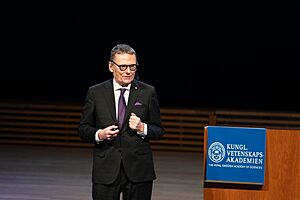James A. Robinson facts for kids
Quick facts for kids
James A. Robinson
|
|
|---|---|

Robinson at 2024 Nobel Week
|
|
| Born | 1960 (age 65–66) |
| Citizenship | United Kingdom American |
| Education | London School of Economics (BSc) University of Warwick (MA) Yale University (PhD) |
| Awards | Nobel Memorial Prize in Economic Sciences (2024) |
| Scientific career | |
| Institutions | |
| Thesis | The dynamic enforcement of implicit labor contracts under asymmetric information (1993) |
| Doctoral advisor | Truman Bewley |
James Alan Robinson (born in 1960) is a British-American economist and political scientist. He is a professor at the Harris School of Public Policy at the University of Chicago. He used to lead The Pearson Institute for the Study and Resolution of Global Conflicts there. Before that, Robinson taught at Harvard University from 2004 to 2015.
He has written several books with Daron Acemoglu, including The Narrow Corridor, Why Nations Fail, and Economic Origins of Dictatorship and Democracy. In 2024, Robinson, Acemoglu, and Simon Johnson won the Nobel Memorial Prize in Economic Sciences. They received the award for their studies comparing why some nations become rich and others stay poor.
Contents
Education and Early Career
James Robinson studied economics at several top universities. He earned his first degree, a Bachelor of Science, from the London School of Economics and Political Science in 1982. Later, he received a Master of Arts from the University of Warwick in 1986. He completed his studies with a Doctor of Philosophy (PhD) in economics from Yale University in 1993.
His main areas of study are political economy and how countries develop economically and politically.
Academic Work and Research
In 2004, Professor Robinson became an Associate Professor at Harvard University. He held important teaching positions there until 2015. On July 1, 2015, he joined the Harris School of Public Policy Studies at the University of Chicago. He was named one of the university's nine special University Professors. In 2016, he received an honorary doctorate from the National University of Mongolia.
Professor Robinson has done research in many countries around the world. These include Botswana, Chile, the Democratic Republic of the Congo, Haiti, and Colombia. He teaches in Bogotá, Colombia, every summer. In March 2023, he visited Tashkent, Uzbekistan. There, he talked about how countries can build strong, fair systems, especially after being colonies. He also discussed his book Why Nations Fail.
He often works with his long-time co-author, Daron Acemoglu. They first met at the London School of Economics.
Understanding Democracy
One of Robinson's important books is Economic Origins of Dictatorship and Democracy (2006). He wrote this book with Daron Acemoglu. It looks at how democratic societies are created and how they stay strong. They explain that democracy lasts when powerful groups don't have a strong reason to overthrow it. This depends on things like how strong regular people are, how political systems are set up, and how much economic inequality there is.
Why Nations Succeed or Fail
In their book Why Nations Fail: The Origins of Power, Prosperity, and Poverty (2012), Acemoglu and Robinson explore why some countries become rich and others stay poor. They argue that for a country to grow and use new technology, it needs political stability. It also needs "creative destruction." This means old ways of doing things must be replaced by new, better ones. This can only happen if there are rules against giving special rights to a few powerful companies.
For example, they point out that the Industrial Revolution started in Great Britain. This was because the English Bill of Rights 1689 helped create rules that allowed new ideas to thrive. They give an example of a steamboat built in 1705 by Denis Papin. It was destroyed by a boatmen's group in Germany. Papin then went to London, where his ideas were published. Later, Thomas Newcomen used Papin's work to create successful steam engines.
Acemoglu and Robinson believe that differences in how countries develop are mainly due to their political and economic systems. They do not think that culture, weather, or geography are the main reasons. For instance, they say that Soviet Russia grew fast at first by copying advanced technologies. But it slowed down by the 1970s because it lacked "creative destruction."
The Balance of Power
Their 2019 book, The Narrow Corridor. States, Societies, and the Fate of Liberty, also written with Acemoglu, discusses how a free society is achieved. They argue that freedom happens when the power of the government and the power of the people are roughly balanced.
See also
 In Spanish: James A. Robinson para niños
In Spanish: James A. Robinson para niños
- Critical juncture theory
- Economic history
- Environmental determinism
- Institutional economics
- New institutional economics
- Colonial Origins of Comparative Development
 | Georgia Louise Harris Brown |
 | Julian Abele |
 | Norma Merrick Sklarek |
 | William Sidney Pittman |


